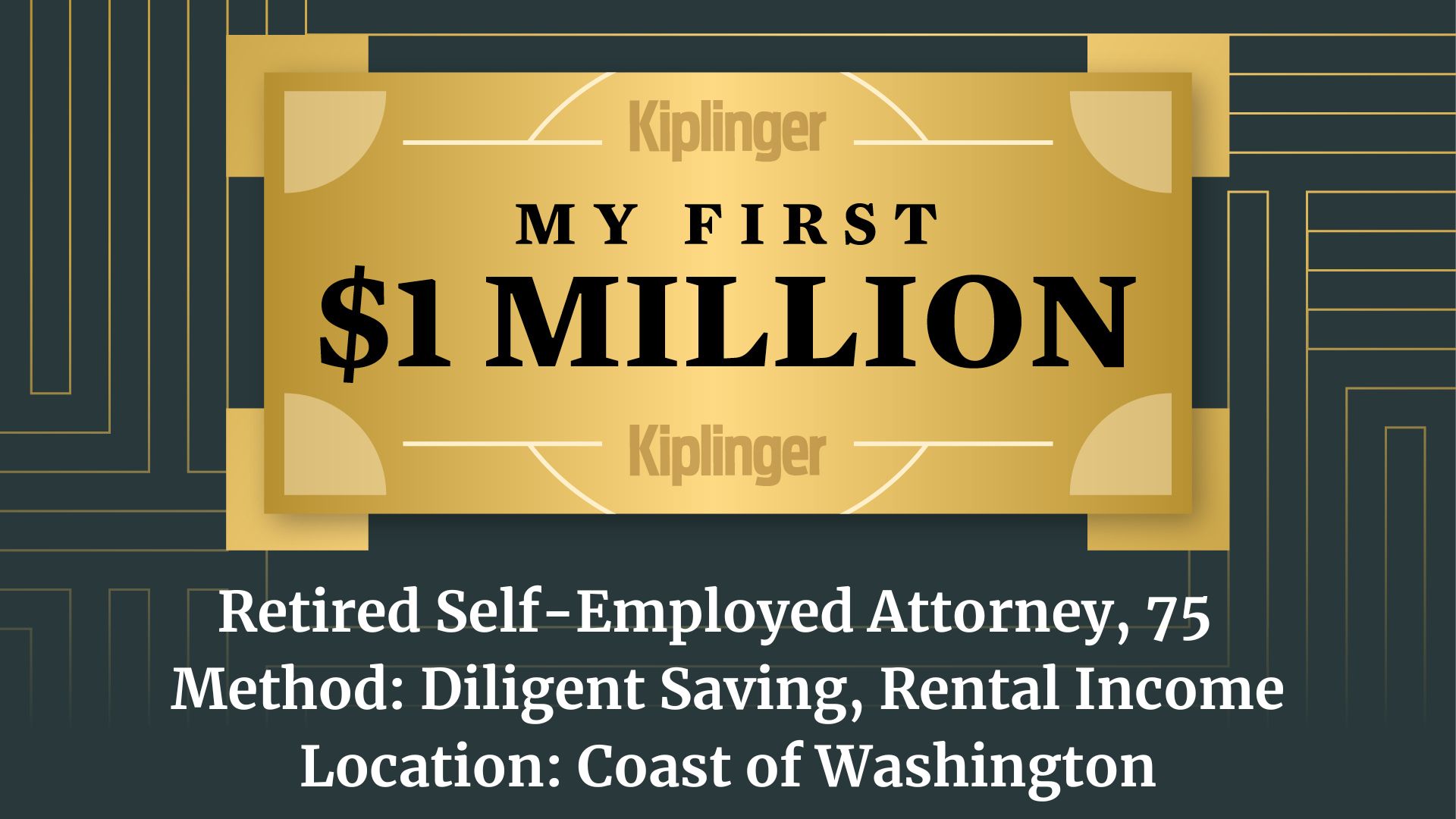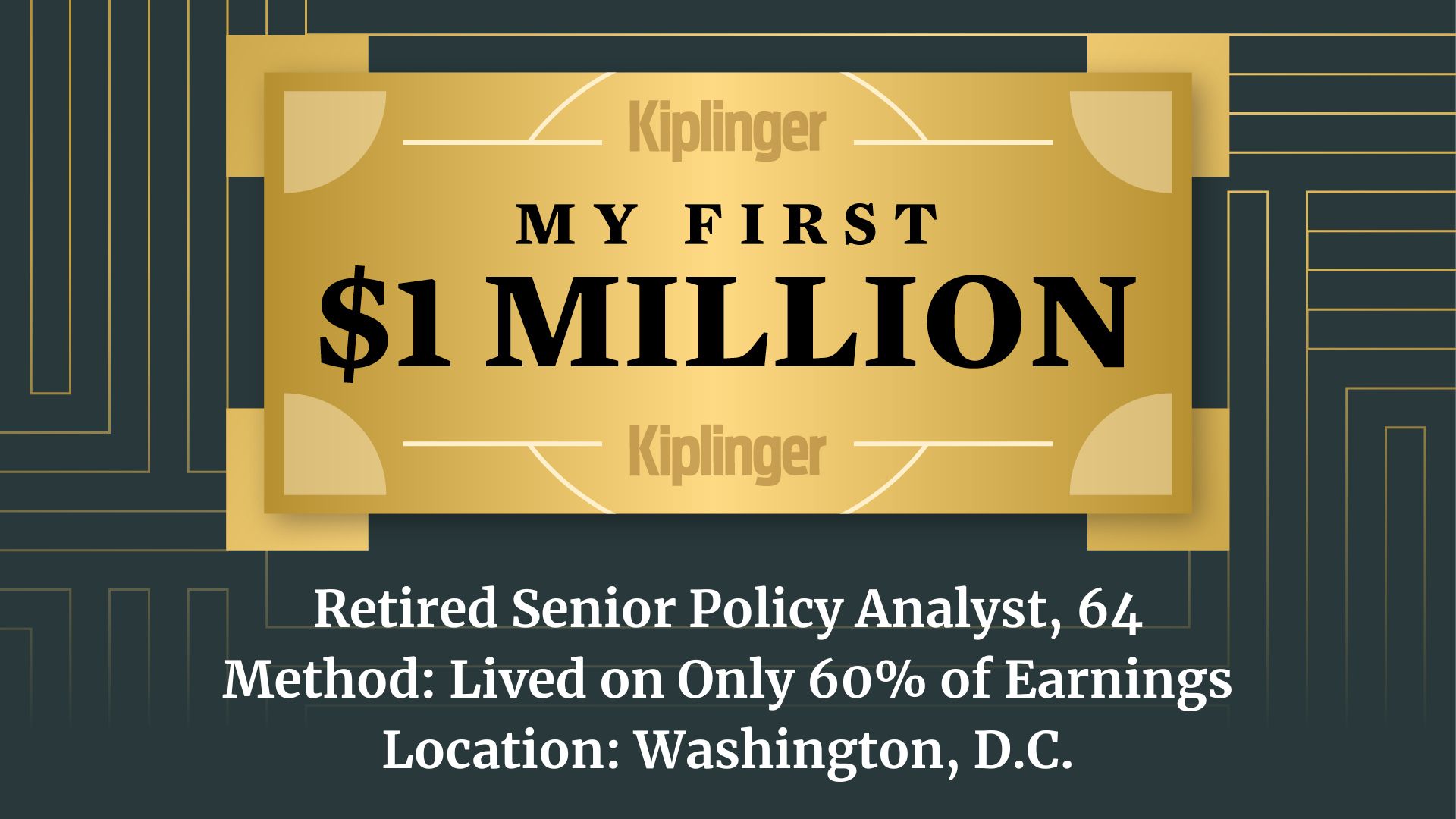My First $1 Million: Retired Self-Employed Attorney, 75, Coast of Washington
"Whenever I got a few bucks up, the money went into my defined contribution plan. When I hit about age 50, the money began to multiply."


Profit and prosper with the best of Kiplinger's advice on investing, taxes, retirement, personal finance and much more. Delivered daily. Enter your email in the box and click Sign Me Up.
You are now subscribed
Your newsletter sign-up was successful
Want to add more newsletters?
Welcome to Kiplinger's My First $1 Million series, in which we hear from people who have made $1 million. They're sharing how they did it and what they're doing with it. This time, we hear from a retired self-employed attorney, 75, who spent most of his life in Portland, Ore., but now lives on the Washington coast.
See our earlier profiles, including a writer in New England, a semiretired entrepreneur in Nashville, an events industry CEO in Northern New Jersey, an early retiree in Western North Carolina and an Air Force Veteran in Duluth, Ga.
Each profile features one person or couple, who will always be completely anonymous to readers, answering questions to help our readers learn from their experience.
From just $107.88 $24.99 for Kiplinger Personal Finance
Become a smarter, better informed investor. Subscribe from just $107.88 $24.99, plus get up to 4 Special Issues

Sign up for Kiplinger’s Free Newsletters
Profit and prosper with the best of expert advice on investing, taxes, retirement, personal finance and more - straight to your e-mail.
Profit and prosper with the best of expert advice - straight to your e-mail.
These features are intended to provide a window into how different people build their savings — they're not intended to provide financial advice.
THE BASICS
How did you make your first $1 million?
I made my first million by salting away any legal fees that exceeded my routine living expenses. I had a hardscrabble childhood and upbringing. I was not an outstanding student in college or law school, but I did OK.
I hung out a shingle right after law school, and I worked as a public defender for years. As the decades rolled by, I became a respected trial lawyer. Eventually, I shifted my practice to personal injury cases. Many of these cases made fees in the multiple hundreds of thousands. I organized my law practice as a professional corporation.

Meanwhile, I bought several low-end residential rental buildings scattered around the Portland, Ore., area. These began paying me a monthly rent beginning when I was about age 55. After managing these for 20 years, I sold them all.
At about age 45, I established a defined contribution plan, which was a great wealth-building device. This is a valuable savings plan available to small-business owners. Whenever I got a few bucks up, the money went into my plan, and from there, I just kept it in an index fund with low management fees.
When I hit about age 50, the money in the plan began to noticeably add up and multiply. It eventually grew to $1 million. Now it's closer to $3 million.

What are you doing with the money?
I did nothing with my first million because it was locked in a pretax retirement plan. I just read the monthly statements and watched it grow.
THE FUN STUFF
Did you do anything to celebrate?
I went on a camping trip. Notice that I have lived in the Pacific Northwest for my entire adult life.

What is the best part of making $1 million?
The slow but steady accretion of stock market investments.
Did your life change?
No change in lifestyle. I do not seek "prestige." I reject life in the fast lane.
Any plans to retire early?
I retired at age 72. I worked for as long as I could.
LOOKING BACK
Anything you would do differently?
I would set up a defined contribution plan at an earlier age. These plans require that a certain percentage of the money in the plan has to be paid into retirement accounts for my firm's employees.
I cheerfully made these transfers to them because those employees were instrumental to my success.
Did you work with a financial adviser?
I began working with a financial planner when I was about 35.
LOOKING AHEAD
Plans for your next $1 million?
I am now living off the payments from my retirement accounts.
Do you have an estate plan?
I have an estate plan that gives pretty much the whole estate to my only child.

Any advice for others trying to make their first $1 million?
Find a job you like, become self-employed, keep your nose to the wheel. Set up a professional corporation or the like to qualify for special retirement and investment programs.
When you get some surplus capital into a plan, leave it there until age 65-70.
What do you wish you'd known …
Before you retired? That retirement can be kinda boring.
When you first started investing? Put money in the stock market and let it sit.
When you first started working with a financial professional? To learn about defined benefit programs and the like.
If you have made $1 million or more and would like to be anonymously featured in a future My First $1 Million profile, please fill out and submit this Google Form or send an email to MyFirstMillion@futurenet.com to receive the questions. We welcome all stories that add up to $1 million or more in your accounts, although we will use discretion in which stories we choose to publish, to ensure we share a diversity of experiences. We also might want to verify that you really do have $1 million. Your answers may be edited for clarity.
RELATED CONTENT
- You're 62 Years Old With $1 Million Saved: Can You Retire?
- Want to Earn $1 Million More Over Your Lifetime? Do This
- Do You Have at Least $1 Million in Tax-Deferred Investments?
- Are You Rich? U.S. Net Worth Percentiles Can Provide Answers
- Compare Your Net Worth by Age
Profit and prosper with the best of Kiplinger's advice on investing, taxes, retirement, personal finance and much more. Delivered daily. Enter your email in the box and click Sign Me Up.

As Contributed Content Editor for the Adviser Intel channel on Kiplinger.com, Joyce edits articles from hundreds of financial experts about retirement planning strategies, including estate planning, taxes, personal finance, investing, charitable giving and more. She has more than 30 years of editing experience in business and features news, including 15 years in the Money section at USA Today.
-
 Thinking of Switching Phone Carriers? Do These 8 Things First
Thinking of Switching Phone Carriers? Do These 8 Things FirstSwitching carriers is easier than ever, but overlooking the fine print could cost you. Here’s what to check before you make the move.
-
 Samsung Galaxy S26 Ultra: What to Know Before You Upgrade
Samsung Galaxy S26 Ultra: What to Know Before You UpgradeThe Galaxy S26 Ultra brings new features and strong launch deals, but whether it’s worth upgrading depends on what you already own.
-
 Nasdaq Soars Ahead of Nvidia Earnings: Stock Market Today
Nasdaq Soars Ahead of Nvidia Earnings: Stock Market TodayWednesday's risk-on session was sparked by strong gains in tech stocks and several crypto-related names.
-
 What Is an Assumable Mortgage and Could It Save You Thousands?
What Is an Assumable Mortgage and Could It Save You Thousands?With mortgage rates still elevated, taking over a seller’s existing home loan could lower monthly payments — if the numbers work.
-
 Have You Fallen Into the High-Earning Trap? This Is How to Escape
Have You Fallen Into the High-Earning Trap? This Is How to EscapeHigh income is a gift, but it can pull you into higher spending, undisciplined investing and overreliance on future earnings. These actionable steps will help you escape the trap.
-
 I'm a Financial Adviser: These 3 Questions Can Help You Navigate a Noisy Year With Financial Clarity
I'm a Financial Adviser: These 3 Questions Can Help You Navigate a Noisy Year With Financial ClarityThe key is to resist focusing only on the markets. Instead, when making financial decisions, think about your values and what matters the most to you.
-
 Where Olympians Store Their Medals is a Great Lesson For Your Valuables and Cash
Where Olympians Store Their Medals is a Great Lesson For Your Valuables and CashWhat you can learn about protecting your cash and values from where Olympians store their medals.
-
 An Executive's 'Idiotic' Idea: Skip Safety Class and Commit a Federal Crime
An Executive's 'Idiotic' Idea: Skip Safety Class and Commit a Federal CrimeSeveral medical professionals reached out to say that one of their bosses suggested committing a crime to fulfill OSHA requirements. What's an employee to do?
-
 How You Can Use the Financial Resource Built Into Your Home to Help With Your Long-Term Goals
How You Can Use the Financial Resource Built Into Your Home to Help With Your Long-Term GoalsHomeowners are increasingly using their home equity, through products like HELOCs and home equity loans, as a financial resource for managing debt, funding renovations and more.
-
 How to Find Free Money for Graduate School as Federal Loans Tighten in 2026
How to Find Free Money for Graduate School as Federal Loans Tighten in 2026Starting July 1, federal borrowing will be capped for new graduate students, making scholarships and other forms of "free money" vital. Here's what to know.
-
 My First $1 Million: Retired Senior Policy Analyst, 64, Washington, D.C.
My First $1 Million: Retired Senior Policy Analyst, 64, Washington, D.C.Ever wonder how someone who's made a million dollars or more did it? Kiplinger's My First $1 Million series uncovers the answers.